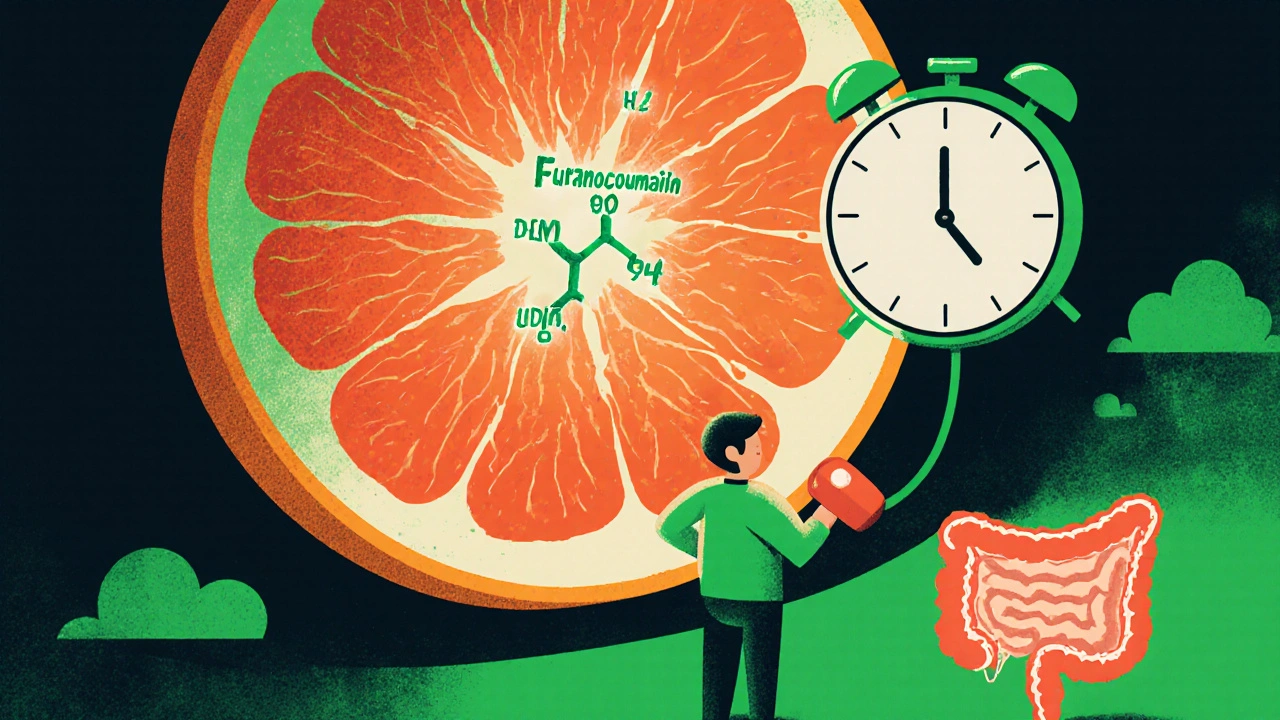
If you're taking a calcium channel blocker for high blood pressure, your morning glass of orange juice might be riskier than you think. Not all citrus is the same, but grapefruit can turn your prescribed dose into something dangerous-sometimes without you even realizing it.
Why Grapefruit Is a Problem
Grapefruit doesn't just taste bitter-it changes how your body handles certain medications. The problem lies in chemicals called furanocoumarins, found in high amounts in grapefruit and a few other citrus fruits. These compounds disable an enzyme in your gut called CYP3A4, which normally breaks down drugs like calcium channel blockers before they enter your bloodstream. When this enzyme is blocked, your body absorbs way more of the drug than it should. A single 200ml glass of grapefruit juice can shut down CYP3A4 for up to 72 hours. That means even if you drink grapefruit juice at breakfast and take your blood pressure pill at night, you're still at risk. For some calcium channel blockers, this isn't just a small bump in dosage-it's a massive spike. With felodipine, one of the most affected drugs, grapefruit juice can increase drug levels by 3 to 5 times. That’s like taking three pills instead of one. For older adults or people with heart conditions, this can lead to dangerously low blood pressure, dizziness, fainting, or even a fall.Which Calcium Channel Blockers Are Most Affected?
Not all calcium channel blockers react the same way to grapefruit. The biggest risks are with the dihydropyridine group:- Felodipine - Highest risk. Bioavailability can jump up to 500% with grapefruit juice.
- Nicardipine - Also significantly affected. Commonly prescribed for hypertension.
- Nimodipine - Used for brain blood vessel spasms. Package insert includes a black box warning about grapefruit.
- Pranidipine - Less common but still risky.
- Amlodipine - Less dramatic interaction, but still present. Not safe to assume it’s harmless.
What About Other Citrus Fruits?
Grapefruit isn’t the only citrus fruit to worry about. Seville (sour) oranges and tangelos also contain furanocoumarins and should be avoided. Even orange marmalade made from Seville oranges can trigger the same reaction. Sweet oranges-like navel or Valencia-are generally safe. They don’t have enough of the problematic compounds to cause issues. But here’s the catch: some orange juices are blended with grapefruit or contain added grapefruit extract. Always check the label. If you're unsure, stick to plain water with your pill. It’s the only way to be 100% safe.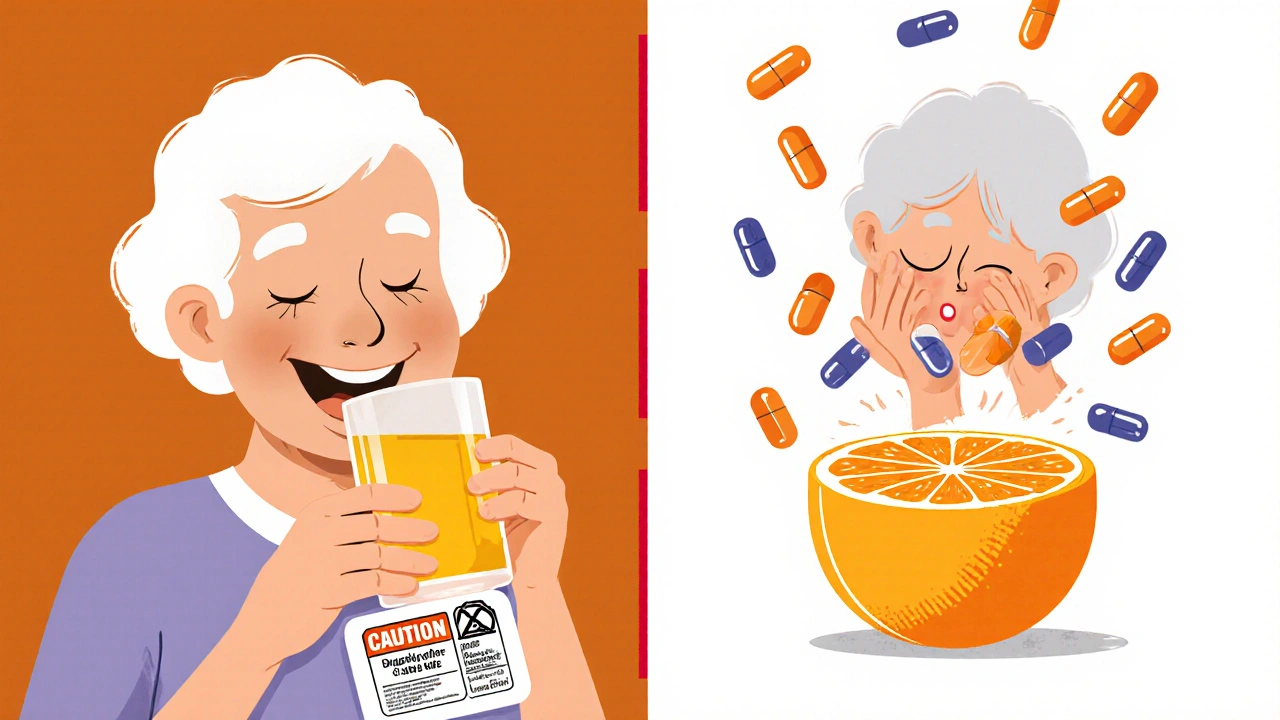
What Happens When You Mix Them?
The effects aren’t always immediate, but they’re real. People often feel fine at first, then suddenly get lightheaded or dizzy hours later. That’s because the enzyme inhibition builds up over time. Symptoms of too much calcium channel blocker in your system include:- Severe dizziness or lightheadedness
- Low blood pressure (below 90/60 mmHg)
- Swelling in ankles or feet
- Flushing or warmth in the face
- Rapid or irregular heartbeat
- Fainting or near-fainting episodes
What Should You Do Instead?
The safest move? Avoid grapefruit and its close relatives entirely while taking these medications. If you love citrus and need to keep taking your blood pressure pill, talk to your doctor about switching to a safer alternative. Some options with little to no grapefruit interaction include:- Lisinopril (an ACE inhibitor)
- Valsartan (an ARB)
- Hydrochlorothiazide (a thiazide diuretic)
- Metoprolol (a beta blocker)
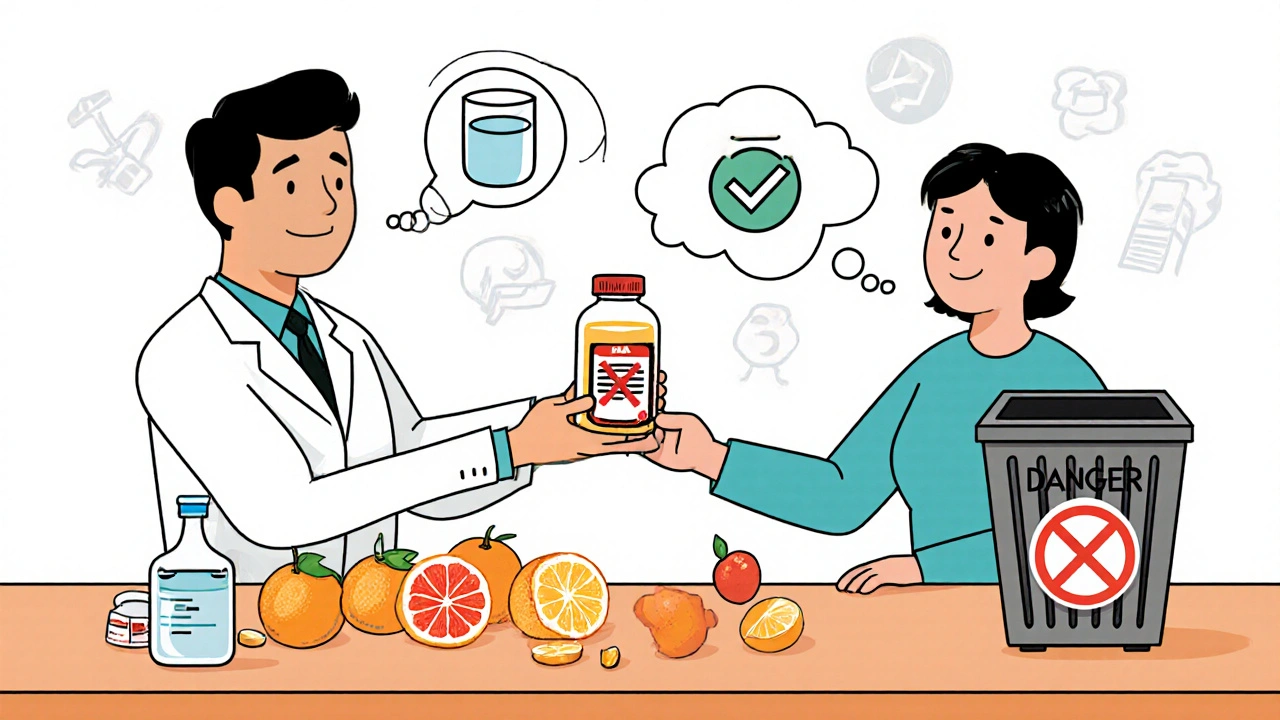
Why This Interaction Is Still Overlooked
Despite being documented since 1989, this interaction remains under-recognized. A 2022 survey found only 37% of primary care doctors routinely ask patients about grapefruit consumption before prescribing calcium channel blockers. And 68% of patients had no idea grapefruit could be dangerous with their meds. This isn’t just a gap in knowledge-it’s a gap in safety. An estimated 15,000 emergency room visits each year in the U.S. alone are tied to grapefruit-drug interactions, mostly involving blood pressure medications. Even when patients are warned, they often think they can "get away with" a small amount. But research shows: one glass is enough. And the effect lasts days. There’s no safe amount.What’s Changing in the Future?
Researchers are working on solutions. Two new extended-release versions of amlodipine are currently in Phase III clinical trials. Early results show a 70% reduction in grapefruit interaction potential. That’s promising-but it’s still years away from being widely available. Until then, the advice hasn’t changed: if you’re on a calcium channel blocker, skip the grapefruit. Don’t risk it for a glass of juice.Quick Checklist: Grapefruit and Your Blood Pressure Meds
- ❌ Avoid grapefruit, Seville oranges, and tangelos completely.
- ✅ Sweet oranges (navel, Valencia) are generally safe-check labels on juice.
- ❌ Don’t assume timing helps. Juice in the morning, pill at night? Still risky.
- ✅ Ask your pharmacist or doctor: "Is my blood pressure medication affected by grapefruit?"
- ✅ If you’re unsure, switch to a safer alternative like lisinopril or metoprolol.
Your medication works best when it’s predictable. Grapefruit makes it unpredictable-and potentially dangerous. It’s not worth the gamble.
Can I drink orange juice with my calcium channel blocker?
Regular sweet orange juice (like navel or Valencia) is generally safe. It doesn’t contain enough furanocoumarins to interfere with calcium channel blockers. But avoid orange juice blends, marmalades, or products that list grapefruit or Seville orange as ingredients. Always check the label.
How long does grapefruit affect my medication?
The enzyme-blocking effect of grapefruit lasts up to 72 hours after consumption. That means even if you drink grapefruit juice in the morning and take your pill at night, you’re still at risk. Waiting a few hours between them won’t prevent the interaction.
Is amlodipine safe with grapefruit?
Amlodipine has a lower risk than felodipine or nimodipine, but it still interacts with grapefruit. Studies show a measurable increase in blood levels. It’s not considered safe to mix them. If you want to drink grapefruit juice, talk to your doctor about switching to a non-interacting blood pressure medication like lisinopril or metoprolol.
What if I accidentally ate grapefruit with my pill?
If you only had a small amount once, monitor yourself for dizziness, lightheadedness, or swelling. If you feel fine, you’re likely okay-but don’t repeat it. If you experience severe dizziness, fainting, or a rapid heartbeat, seek medical help immediately. Going forward, avoid grapefruit entirely while on this medication.
Why do some doctors say it’s not a big deal?
Some doctors may not be fully aware of the latest research or may underestimate how common this interaction is. Studies show nearly 70% of patients don’t know about the risk, and only a third of doctors ask about grapefruit use. The evidence is clear: this interaction can be deadly. Always follow the advice of pharmacists and cardiology guidelines, which recommend complete avoidance.
15 Comments
Katie Baker
November 16 2025
This is actually super helpful. I had no idea grapefruit could do this. Thanks for laying it out so clearly - I'm switching to water with my meds now.
Adam Dille
November 16 2025
I get why people ignore this. It's not like the label says "DO NOT MIX WITH CITRUS OR YOU WILL DIE." But honestly? This post saved me from a possible ER trip. Thanks for the heads-up.
Chris Bryan
November 18 2025
This is all part of the pharmaceutical industry's plan to make you dependent. They don't want you to know you can just drink lemon water and stop taking pills. They profit off your fear. And now they're scared you'll find out grapefruit is natural and free.
John Foster
November 20 2025
The real tragedy here isn't the grapefruit-it's the erosion of personal autonomy in modern medicine. We've been trained to swallow chemicals without question, to treat our bodies as machines that require firmware updates from corporate labs. The CYP3A4 enzyme isn't just a metabolic gatekeeper-it's a symbol of our surrender to biochemical determinism. And now we're told even a glass of juice is a betrayal of our own physiology. How many other silent wars are being waged inside us, unbeknownst and unchallenged?
Jennifer Walton
November 21 2025
Some things are just dangerous. Doesn't need philosophy.
Kihya Beitz
November 23 2025
So let me get this straight. I can't have my morning grapefruit juice because some lab rat in 1989 found out it makes pills stronger? And now I'm supposed to feel guilty for wanting a little tartness with my toast? I'm not dying for a glass of juice. My doctor probably doesn't even know what grapefruit tastes like.
Jonathan Dobey
November 23 2025
Ah yes, the great citrus conspiracy. The FDA, Big Pharma, and the Orange Industrial Complex have conspired to weaponize furanocoumarins against the common man. They don't want you to know that citrus peel contains alkaloids that can reverse insulin resistance-no, they'd rather you choke down synthetic dihydropyridines while sipping sterile H2O like a corporate drone. The real drug isn't felodipine-it's obedience.
ASHISH TURAN
November 24 2025
I appreciate this detailed breakdown. I'm on amlodipine and used to drink orange juice every day. Now I'll check labels carefully. Small changes matter. Thank you for sharing this knowledge.
Shyamal Spadoni
November 25 2025
I read this and i thought maybe its all fake like the 5g thing. I mean why would juice do this? I looked it up and its real. But then i thought maybe the whole medical system is lying to us about everything. Like why do they say amlodipine is low risk? Maybe its just not tested enough. Maybe they dont want us to know the truth about all meds. I think they want us to be sick so we keep buying pills. And grapefruit is just the tip of the iceberg. I think the government knows this but they let it happen because it makes money.
Edward Ward
November 25 2025
I'm fascinated by the pharmacokinetics here. The fact that furanocoumarins irreversibly inhibit CYP3A4 through mechanism-based inactivation-not just competitive inhibition-is what makes this interaction so insidious. It's not about concentration or timing; it's about covalent modification of the enzyme's active site. That's why even a single glass can have a 72-hour effect. Most people think it's like alcohol-"I'll just wait a few hours"-but this is more like pouring concrete into your liver's plumbing. The clinical implications are massive, especially for polypharmacy patients. I wish more prescribers understood this at a biochemical level, not just as a "avoid grapefruit" checklist item.
Jessica Chambers
November 26 2025
I love grapefruit. 😔 But I guess I'll just cry into my water now. #MedicationLife
Ogonna Igbo
November 28 2025
In Nigeria we don't even have access to these fancy pills. We use herbs, bitter leaves, and prayer. Why are you people so obsessed with chemical solutions? Your body is not a machine. You are not a lab rat. This whole thing is a Western obsession with control. Let nature work. Let your blood pressure find balance. Stop drinking juice and start living.
BABA SABKA
November 29 2025
This is basic pharmacology. CYP3A4 inhibition is textbook. But what's not discussed is the economic incentive: if patients stop taking their meds due to dietary restrictions, the market shrinks. So they downplay the risk. Meanwhile, the real danger is the pharmaceutical-industrial complex keeping you dependent on daily pills while hiding the truth behind "low interaction" labels. This isn't about grapefruit-it's about corporate control of health narratives.
Andrew Eppich
November 30 2025
I am a physician. This post is accurate. Patients frequently underestimate this interaction. I have seen multiple cases of hypotension requiring hospitalization. Avoid grapefruit. It is not a suggestion. It is a medical directive.

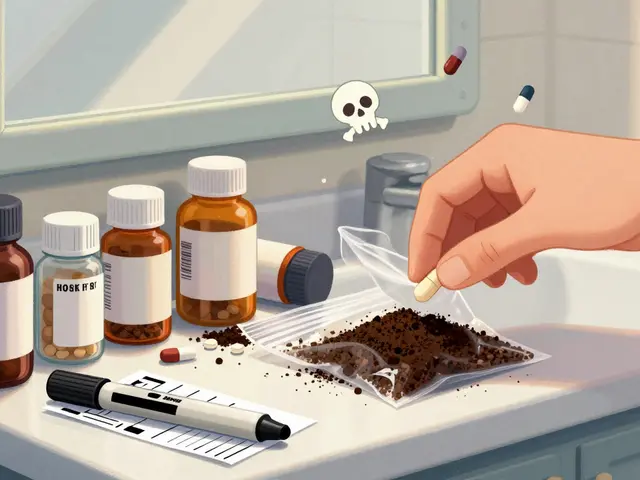
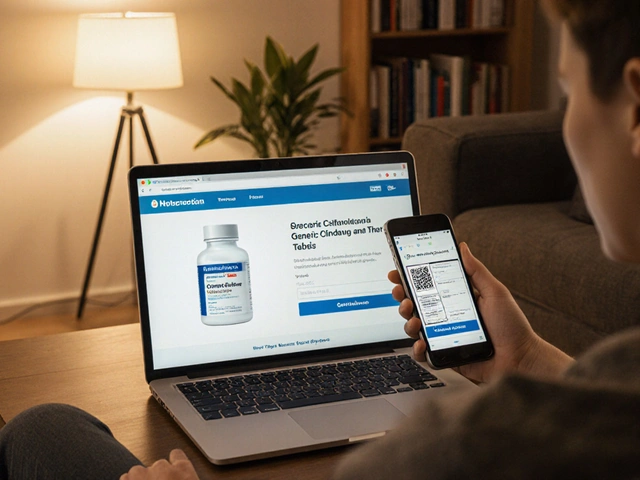
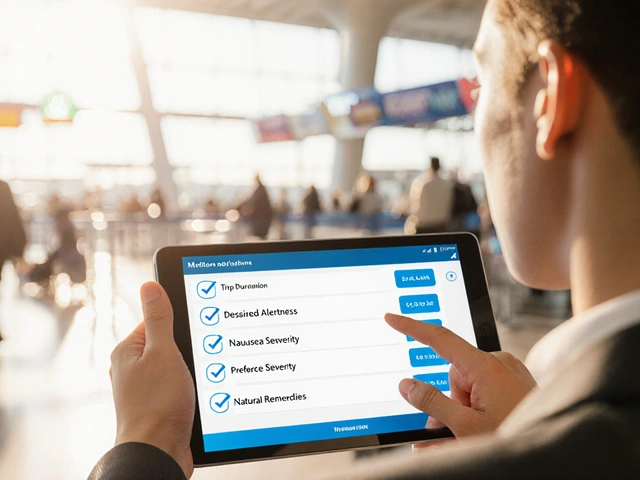
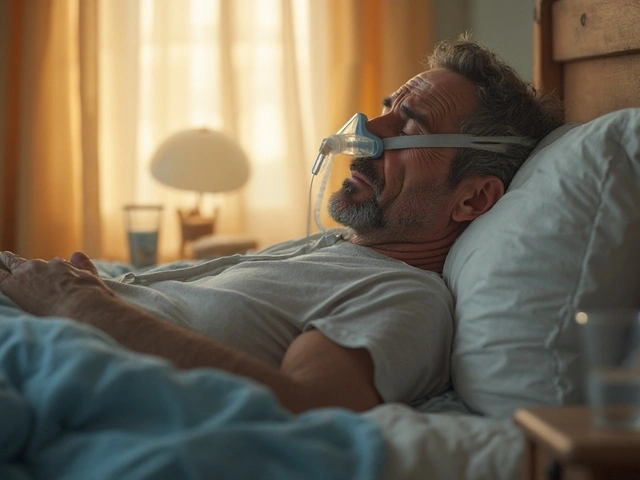
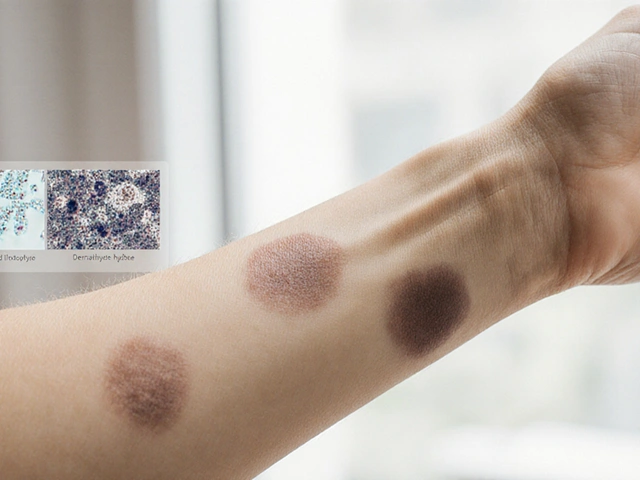
Aidan McCord-Amasis
November 15 2025
I just drank orange juice with my amlodipine and I'm fine. 😎 Probably fine. Probably.